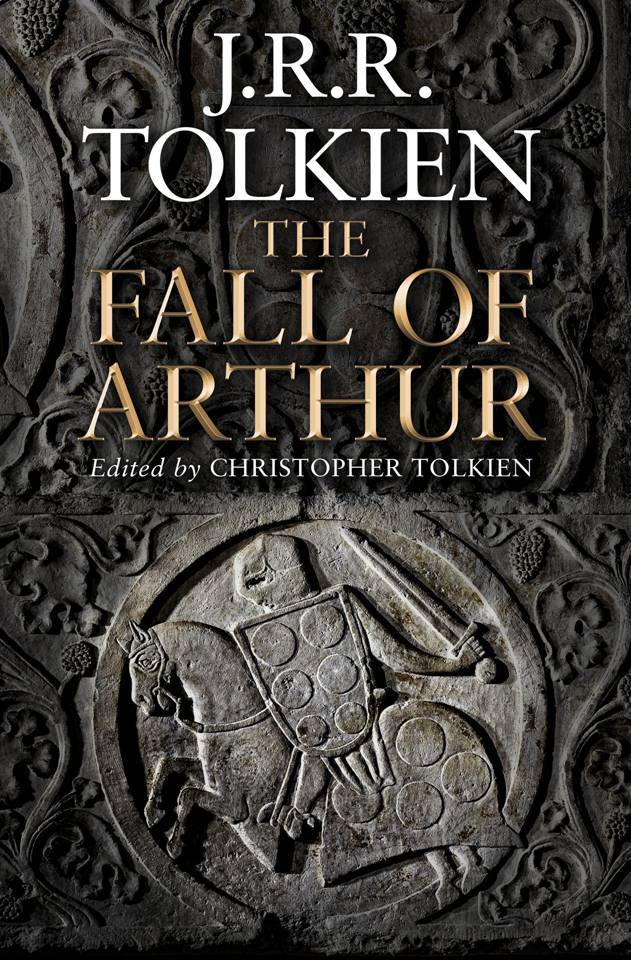Mine has a manuscript page...
Here are my thoughts moved from the list sticky:
"The Fall of Arthur" by J.R.R.Tolkien,
ed. Christopher Tolkien. Harper Collins, 2013.
I picked this up within a few days of its publication date, during Whitsuntide 2013. (As I noted on TORn around that time, it was a nice touch that the book was released in that particular week due to Whitsuntide's prominence in several of the traditional renderings of Arthurian Legends.) However, I didn't read
The Fall of Arthur right away because I wanted to finish
Chretien de Troyes,
Malory,
Monmouth and a version of
The Romance of Tristan and Iseult "as retold by Joseph Bedier" (an excellent version first published in 1900, during Tolkien's youth). I had read other versions of Malory (
Caxton/Vinaver) and Chretien, had previously abandoned Monmouth, and have a few other titles under my belt (Tennyson's
Idylls of the King and Tolkien and Lewis' "friend" Roger Lancelyn Green's
King Arthur and his Knights of the Round Table to name only two).
Basically, since learning almost a year ago that
The Fall of Arthur was to be published, apart from The Bible and some work-related books on restorative justice, I've only been reading Arthur and related works. Tolkien's poem, though incomplete, is a beautiful addition to the existing body of Arthurian literature. Actually, in its final (present) form, being "unfinished" as it were, places it in good stead among most standard Arthur works with their missing pages, passages lost in translation and many themselves in various
stages of completion.
By way of review, I don't think one can do better than
this piece from the NY Times Sunday Review of Books, June 21 2013.
For my part:
At first blush, read silently, I found Tolkien's poem to be challenging, its form distracting. However when I read it again, this time aloud to my love, its brilliance was undeniable. Perhaps Tolkien intended his poem to be read aloud? If so, CT makes no mention of this.
The book,
The Fall of Arthur in total, is engaging -- I thoroughly enjoyed Christopher's voice throughout. In troth, I would go so far as to say the book's value lays in Christopher's essays that attend his father's poem. For instance, his discussion of Tolkien's sources (the "alliterative Morte Arthure" and "stanzaic Morte Arthur", Monmouth, Chretien and Malory) is especially important in that he, successfully I believe, demonstrates how his father rationalized the oft glaring differences among the traditional/early renderings to create something new, perhaps truly English. It did appear that Christopher downplayed Chretien somewhat (perhaps in honour of his father's aim to make an English work); and he seems to have overlooked completely the aforementioned Tristan and Iseult: J.R.R. Tolkien's take on Lancelot and Guinevere is his own, blissfully so; yet in some ways it more closely resembles [the French] Tristan than the tales of Lancelot widely held to have been inspired by Tristan. (It may be that Tolkien is truer to source than even Chretien!) (UUT)
In fairness, nowhere does CT state that his father left a list of his sources for the poem. Rather, I suspect Christopher was reasoning from versions he himself was familiar. Regardless, his knowledge of the subject is exhaustive and he graciously and liberally reproduced long swaths of text from the versions he cited throughout his essays; he even went so far as to provide a running glossary along side the more challenging inclusions (i.e. passages of Old English and Middle English). CT's painstaking analysis of his father's notes, and draft pages not part of the finished piece, are wonderful additions to the text. I would have appreciated a bibliography -- at best a niggle in that CT did weave bibliographic information into the text as he went.
For those looking less for Arthur and more for Middle-earth, clearly The
Fall of Arthur is a poem by J.R.R.Tolkien. Mirkwood is there, if only as a description of the land; but too there are vivid,
Tolkien-esque descriptions of the land,
not often a feature of Arthur legends. There is haunting allusion (e.g. rather than straight exposition) describing human relations and the hunted... in his poem Tolkien draws a dark veil over the unfolding tale, evoking a mood similar to the days before the Battle of Pelennor Fields... and as a special bonus CT included a dissertation on how his father may have imagined that the Isle of Avalon was in fact The Lonely Isle, the Tol Eressëa.
In short, I am extremely pleased with this Tolkien and his son Christopher's book.

